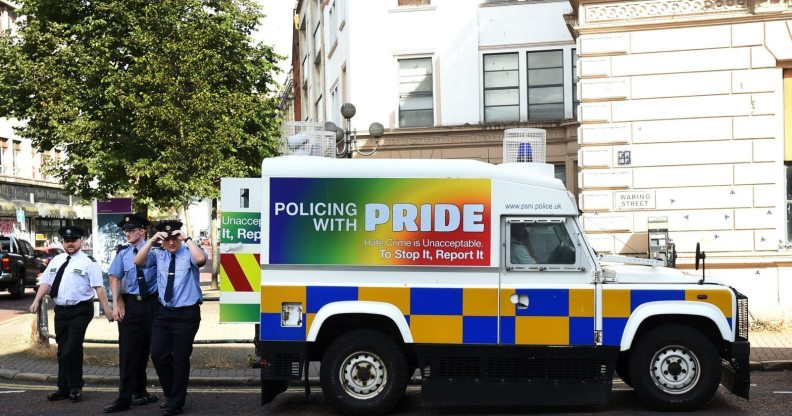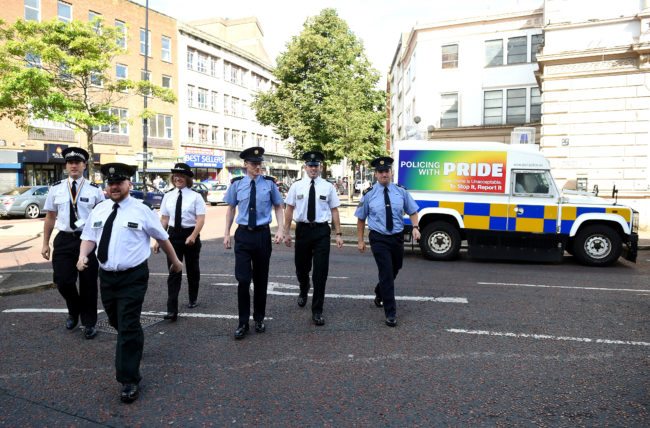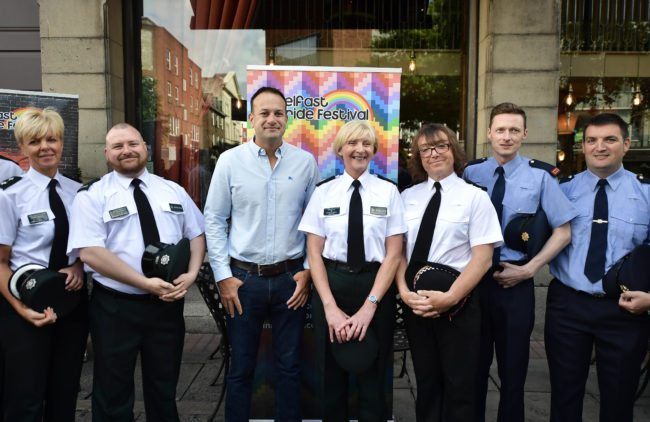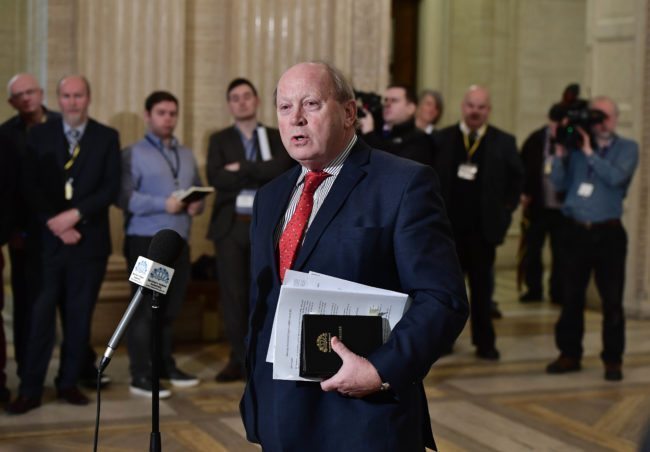Northern Ireland police launch recruitment drive for gay officers

BELFAST, NORTHERN IRELAND – AUGUST 05: PSNI and Garda officers representative of the gay community exit a PSNI landrover before taking part in the Belfast Gay Pride parade on August 5, 2017 in Belfast, Northern Ireland. The province is the only part of the United Kingdom which does not recognise same sex marriage. The Irish Republic’s first gay prime minister Taoiseach Leo Varadkar today predicted it is only a matter of time before same sex marriage is legalised in the north. Mr Varadkar was speaking at a Pride breakfast event. (Photo by Charles McQuillan/Getty Images)
The Police Service of Northern Ireland is holding a recruitment drive to find gay police officers.
The police force announced this week that it is holding a recruitment event to find officers from the LGBT community.
The two events, which will be held in Belfast next month, are billed as “information evenings for the LGBTQ+ community”.
Officials explained: “At these events you’ll be able to find out more information on the recruitment process and hear about the experiences of serving LGBT+ Police officers in the Police Service.
“Both events will feature a panel of serving officers and Human resources staff there to answer your questions relating to the recruitment process and about the exciting career possibilities in the Police Service.”
LGBT campaigners have welcomed the outreach, which is the first of its kind in Northern Ireland – and comes after historically poor relations between police and LGBT people.
Northern Ireland was the last part of the UK to decriminalise gay sex in 1982, after a European court ruling struck down the region’s anti-gay buggery and gross indecency laws.
Prior to partial decriminalisation, the LGBT community was extensively targeted by police, while leading politicians led calls to keep laws banning gay sex.

PSNI officers at Belfast Pride (Photo by Charles McQuillan/Getty Images)
But the PSNI hopes the events will help mend bridges – and bolster LGBT representation inside the force.
PSNI Deputy Chief Constable Drew Harris said: “As part of our ongoing engagement towards under-represented groups within our organisation we have been working closely with a number of external agencies and we will be holding a number of information sessions regarding our current recruitment campaign.
“The Police Service of Northern Ireland is committed to ensuring our workforce is totally representative of the community we serve and that we are seen as an employer of choice.”
One of the events will be held at the Belfast Trans Resource Centre on November 6, while a second event will he held at The Rainbow Project’s HQ on November 8.

PSNI officers at Belfast Pride and Irish leader Leo Varadkar (Photo by Charles McQuillan/Getty Images)
However, the move has been criticised by anti-LGBT politicians in the country.
TUV (Traditional Unionist Voice) leader Jim Allister, a hardline politician who opposed the decriminalisation of sexuality, was invited on the BBC’s Good Morning Ulster to attack the decision.
He said: “I think it’s totally unwarranted pandering to a group already protected with full equality laws in the law.
“It’s already unlawful to discriminate in employment on grounds of sexual orientation, so why does the PSNI think it necessary to go beyond that for this section of society?
“It should be the merit principle that governs recruitment and that alone and now we are going to bend the merit principle… is that what we’re talking about? It seems to be a politically correct thing to do.”

TUV leader Jim Allister (Photo by Charles McQuillan/Getty Images)
Gavin Boyd of the Rainbow Project promptly rebutted his comments on air.
He saod: “No-one has suggested that merit won’t dictate who’s employed by the PSNI, and that’s a ridiculous comment for Jim Allister to make, to say that merit is going to be suspended.
“What the PSNI are doing is recognising that due to the troubled legacy of criminalisation of our community, which Jim Allister supported at the time, there’s a tension between our community and the police service in Northern Ireland, and that has impacted on the police’s ability to recruit from this community.
“I think it’s a really welcome step that’s part of their wider programme of engagement that police are actually going to those places where LGBT people are, to make it really plain that they support the ability for LGBT people to be recruited into the police, be promoted throught the police and protect people across Northern Ireland.
“I’m glad we’ve been able to support it by allowing our centers to be opened up as a recruitment site.”
Calling out the presence of Allister in the debate, he said: “I think it’s also really important to recognise that when people like Jim Allister are opposed to this, it’s not in isolation.
“Jim Allister supported the criminalisation of gay and bisexual men in Northern Ireland, and perhaps he would rather that instead of the police recruiting LGBT people, they were still locking us up.”

Mr Allister said: “Let’s be very clear, sexual orientation by law is no interest of an employer. Yet now it clearly is.
“Are we just so besotted by politcial correctness, if we want to give it a kind terminology, that we’re going to fall over ourselves for whatever demand the Rainbow Project has, we join in their political campaigning?
“The BBC of course is going to headline it and give it all the assistance it does, because that’s the particular bent the BBC has.”
Mr Boyd added: “Jim Allister is obviously a bit hysterical and emotional this morning, but over the past 20 years there have been substantial reforms to policing in Northern Ireland to make it more accountable and human rights compliant.
“A part of that is making sure the police service reflects the community it seeks to serve. There have been many campaigns to recruit from under-represented communities.
“A service that reflects the community can provide a better service to the community. I think this is a really important step to make sure it reflects the LGBT community as well.”
Mr Allister faced a conduct complaint earlier this year after attempting to smear PinkNews.
The smear was an apparent retaliation to a report that he had allegedly offered an informal pact with the Democratic Unionist Party to help block equal marriage in Northern Ireland – overriding a democratic majority of support for the measure in the Northern Ireland Assembly.
The politician had signalled that he would help the DUP employ a ‘petition of concern’ to hinder LGBT rights, explaining: “TUV is a party committed to traditional family values and will continue to resist attempts by the homosexual lobby to introduce the oxymoron which is same sex marriage to Northern Ireland.”
The TUV lawmaker opposed the decriminalisation of gay sex in the 1980s, and still refuses to say whether he still believed gay sex should be a crime.
Speaking in 2015 when asked if gay sex should be legal he refused to answer the question, adding: “In the 1980s I opposed the legislative change that was made [to legalise gay sex]… gay sex to me is an obnoxious thing.”
Last year, Mr Allister was the only MLA in Northern Ireland to vote against the extension of pardons to men with historical gay sex convictions.
He said: “The House in 2016, in its arrogance, thinks that it can take it upon itself to rewrite the law of 40 years ago.
“It cannot, and it should not. The law was the law. If those who chose to break the law, knowing what the law was, paid a penalty, that was the law taking its course, whether they were homosexual or heterosexual.
“It is now so fashionable to jump on board the LGBT bandwagon that you simply abandon all principles and leave your beliefs outside the door.”

